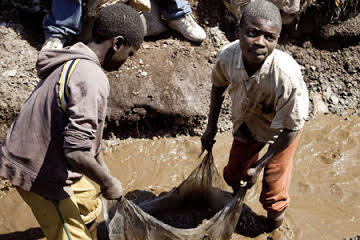NEW YORK – Children as young as seven haul cobalt for foreign companies operating in the Democratic Republic of the Congo. The mineral ends up in smartphones, cars and computers made by such brands as Apple, Microsoft and Vodafone, according to claims by Amnesty International in a new report.
Children carrying back-breaking loads and working in intense heat receive between one or two dollars a day. They work without face masks or gloves, the investigators reported, and are beaten by security guards employed by mining companies.
The new report is titled “This is what we die for: Human rights abuses in the Democratic Republic of the Congo power the global trade in cobalt.”
By tracing how the mineral is traded, the report reveals how miners in the southern region of the DRC sell their ore to independent traders, who then sell it to larger companies for processing and exporting.
One of the biggest buyers of cobalt in the region is Congo Dongfang Mining International (CDM), Amnesty researchers claimed in the report. CDM is a subsidiary of Zhejiang Huayou Cobalt Company Limited, one of the world’s largest manufacturers of cobalt products.
Discovery of the abuse emerged from a joint-investigation between Amnesty and African Resources Watch (AfreWatch), an African NGO focusing on human rights in the minerals and extractive industries. Ninety adults and children who work in five cobalt mine sites were interviewed.
The charges of child labor were strenuously denied by several multinational companies. “Underage labor is not tolerated in our supply chain and we are proud to have led the industry in pioneering new safeguards,” said a spokesman for Apple.
But Amnesty expressed disbelief at the excuses offered companies for not tracing the cobalt they use in their products back to the mines.
“These are some of the biggest companies in the world, with combined profits of $125 billion and there is no excuse that companies aren’t investing some of that profit into ensuring that they can trace where the minerals they are using are coming from,” said Mark Dummett, Amnesty’s business and human rights researcher.
Global demand for cobalt is increasing, but the global cobalt market remains largely unregulated as it falls outside “conflict mineral” legislation regulating the extraction and sale of other mineral such as gold, coltan and tin from the DRC.
Amnesty and AfreWatch are using the findings of the report to call on multinational companies to check for child labor or labor abuses in their supply chains and to be more transparent about their suppliers. [International Press Syndicate | 20 January 2016]

